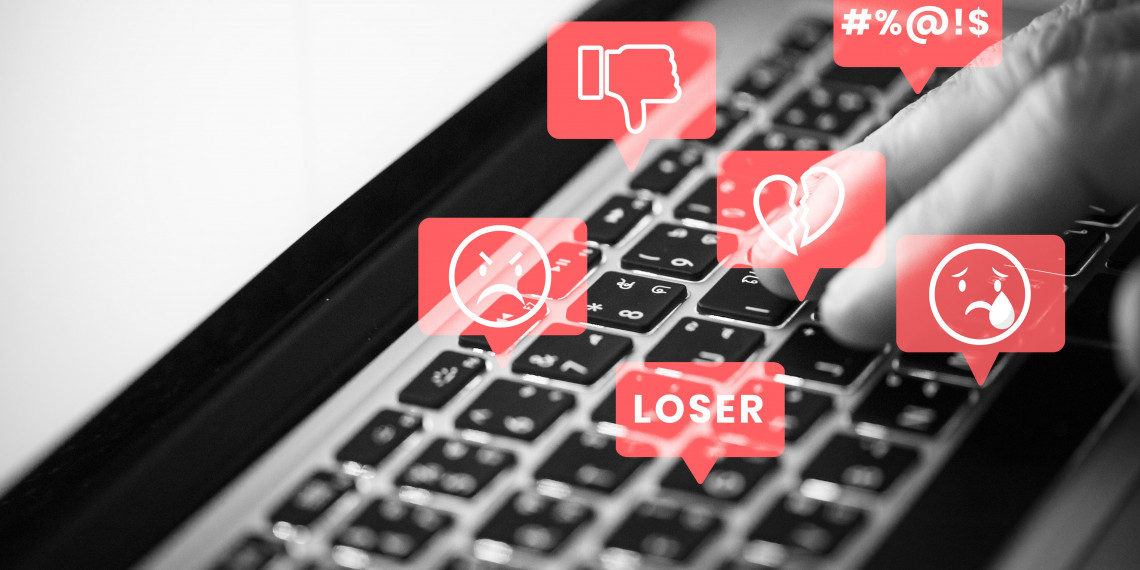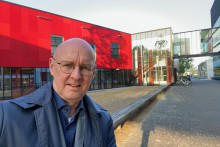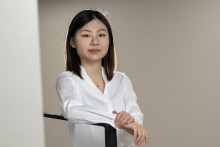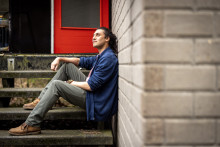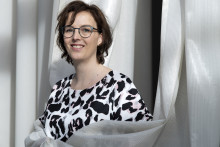It was the end of August when Femke Nijboer, assistant professor at the University of Twente, wrote a column for U-Today expressing her concern about unvaccinated students. The piece was quickly picked up by a journalist from Tubantia who, according to Nijboer, wrote a 'rather biased' article about it. 'The evening editors of the newspaper also put a pretty provocative headline on it. From that moment on it was a case of target practice.'
A flood of (hate) messages followed. Nijboer's Instagram account was hacked and at the entrance to the UT a sign appeared that read 'Femke nazi'. The UT teacher received a special 'alert' from the police for her home address. On the Thursday after the column, Nijboer's doorbell rings at around 10.30 p.m. Bell ringers? She does not open the door, but the next day her neighbours find a piece of broken glass in their letterbox. Coincidence? 'I didn't think it was so harmless anymore.'
'Researchers who speak out are sometimes faced with the choice: am I going to continue? Is it all worth it to me?'
Zero tolerance
Covid-19, climate and migration: scientists who speak out on these subjects in columns, talk shows or newspapers are increasingly faced with threats and intimidation. Dutch universities want to protect their staff members better against this. Together, the university rectors have drawn up a set of guidelines on how to deal with threats and intimidation against academics. A special hotline will be set up and universities will report such incidents more frequently.
UT professor Peter-Paul Verbeek, chairman of the KNAW committee 'Freedom of Scientific Practice', calls it an important step. 'Universities now openly support intimidated researchers. In the past it was sometimes said: they looked for it themselves with all those media appearances.' Verbeek, too, had to deal with hate messages on social media in the past. 'I worked on the CoronaMelder app, which led to some Twitter dredging. But that's nothing compared to what other colleagues have to put up with.'
Verbeek knows that intimidation and threats can lead to self-censorship. Only those who can stand up to the storm remain standing. 'Researchers who speak out are sometimes faced with the choice: am I going to continue? Is it all worth it to me? We have to do everything we can to prevent them from quitting.'
Not normal
According to Verbeek, it is crucial that scientists take part in the public debate. 'Universities are a part of society. We must continue to manifest ourselves.' At the same time, he says, citizens can also be expected to do something. As an example, Verbeek mentions Jaap van Dissel's scientific advice to the cabinet. 'In the end it is up to the politicians to make a decision with this information, not up to scientist Van Dissel. It is part of civic education that people understand this distinction. In my opinion, politics and educational institutions still have a task to perform in this respect.'
Verbeek acknowledges that the problems are deep-rooted. 'The golden egg has not yet been found. But I do think it's high time for some form of regulation of social media.' Verbeek also believes that something needs to be done about the unequal battle that researchers are fighting. 'Scientists who speak out get all kinds of things thrown at them.' Universities should therefore 'counteract' in the media, says Verbeek. 'What Sigrid Kaag did recently during a court case about the threats made against her, I thought that was a good example. It is important that we continue to speak out and say: this is not normal.'
'They are often looking for a lawsuit. For them it' s free publicity. That's why I often just let them rant'
Don't feed the trolls
Maarten van Aalst, UT professor of 'Spatial resilience for Disasters Risk Reduction' at the ITC faculty, regularly speaks in the media about the climate. According to him, such appearances are usually followed by a flood of messages on social media. And according to Van Aalst, there are also 'aggressive' messages among them. 'But I have never experienced physical violence or felt really threatened.'
According to the professor, many of the messages have the same tenor. 'We are said to be climate scientists trying to fill our pockets, we hype the climate issue in order to get as much research money as possible. The term 'green mafia' is also often used. We are accused of trying to make as much headlines as possible with dramatic reports about the climate.'
Van Aalst regularly enters into discussions with his critics on social media. 'But I do make a distinction. I reply to respectful messages as much as possible. I explain that my statements in a 30-second video on the NOS News are based on a report of more than 2000 pages.' According to Van Aalst, it is a task of scientists to discuss the content and share insights. 'As long as it is done in a respectful way.'
For non-respectful messages, Van Aalst applies the adage: 'Don't feed the trolls'. 'I completely ignore the really aggressive messages. They are consciously looking for confrontation.' Van Aalst is also cautious with legal steps in these cases. 'They are often looking for a lawsuit. For them it' s free publicity. That's why I often just let them rant.'
Column
For Nijboer the storm eventually calmed down - although the police alert at her address remained active for some time. She still stands by her column. 'You often hear that teachers have to be neutral. This is true for education. But as a human being and in society, I would say: be coloured. Students can handle that just fine. As a student, you want to meet special and outspoken people at university, don't you? In any case, it is important that we continue to speak out, especially as researchers. Scientists - the name says it all - often know better. We must continue to take part in the debate.'
According to Nijboer, the new initiatives of universities can help. 'I didn't know exactly where to turn. I think it is possible to produce some kind of manual in a one pager. Perhaps there are other ways to get the information across. A theatre performance like Mindlab about intimidation and threats has more impact than a manual, I think.'
Although she did not immediately know where to turn, the help and reactions from the university were 'heart-warming', according to Nijboer. It doesn't mean the intimidation left her cold. 'For example, I said no to a debate on Radio 1. I didn't feel like it. I was a bit intimidated, I guess.'


